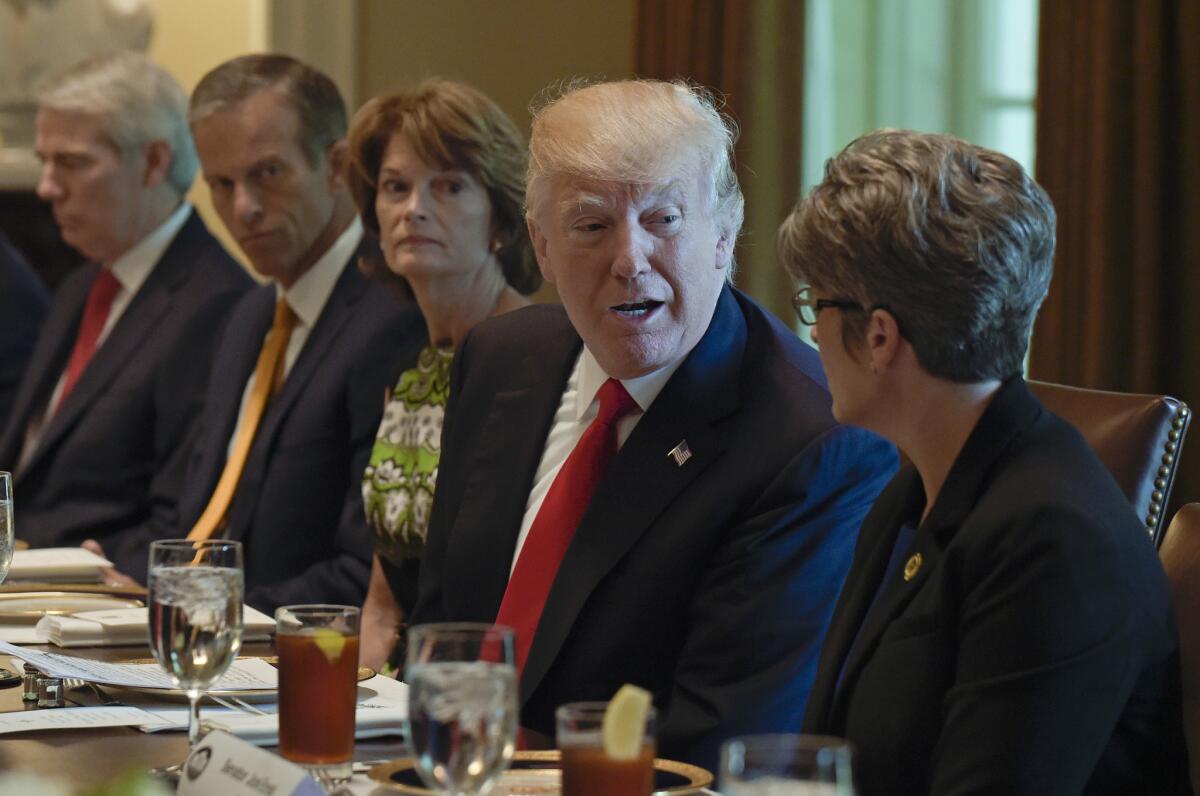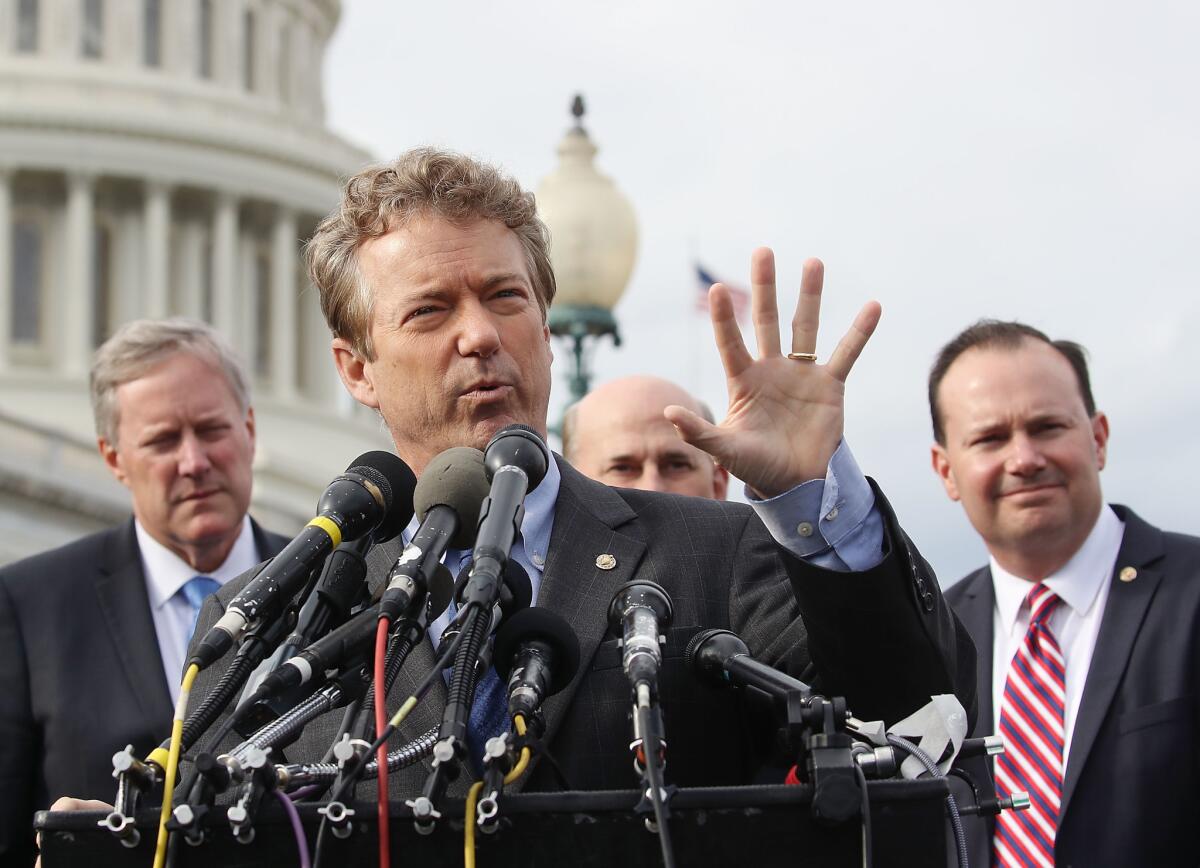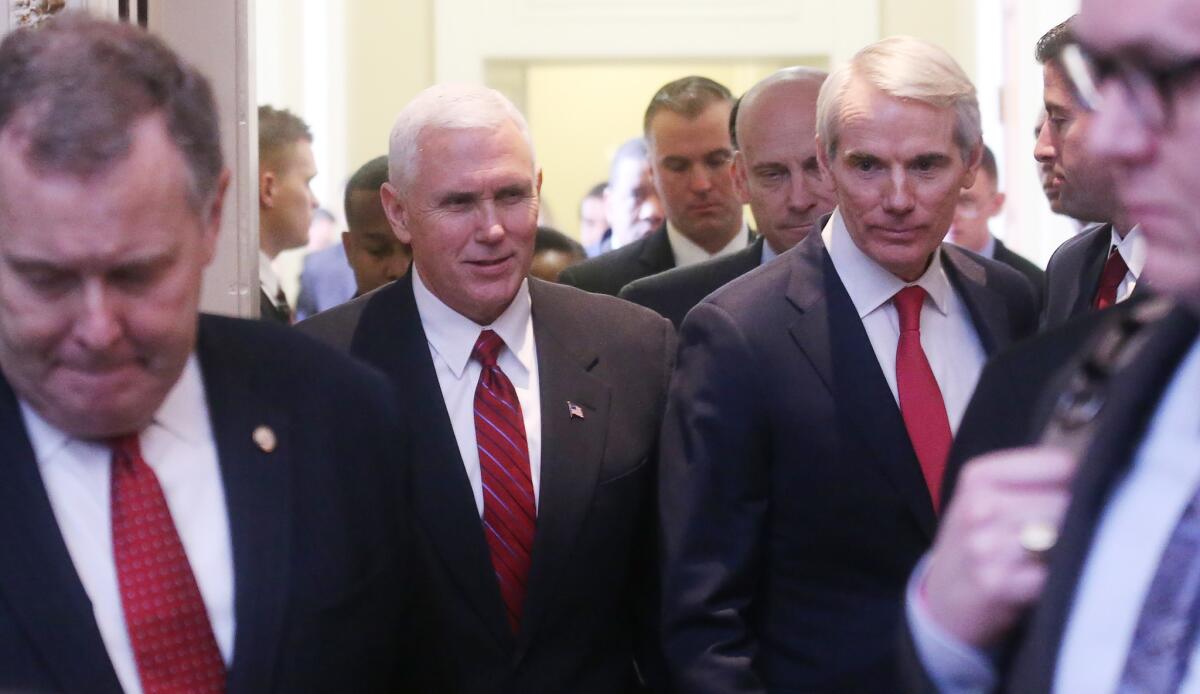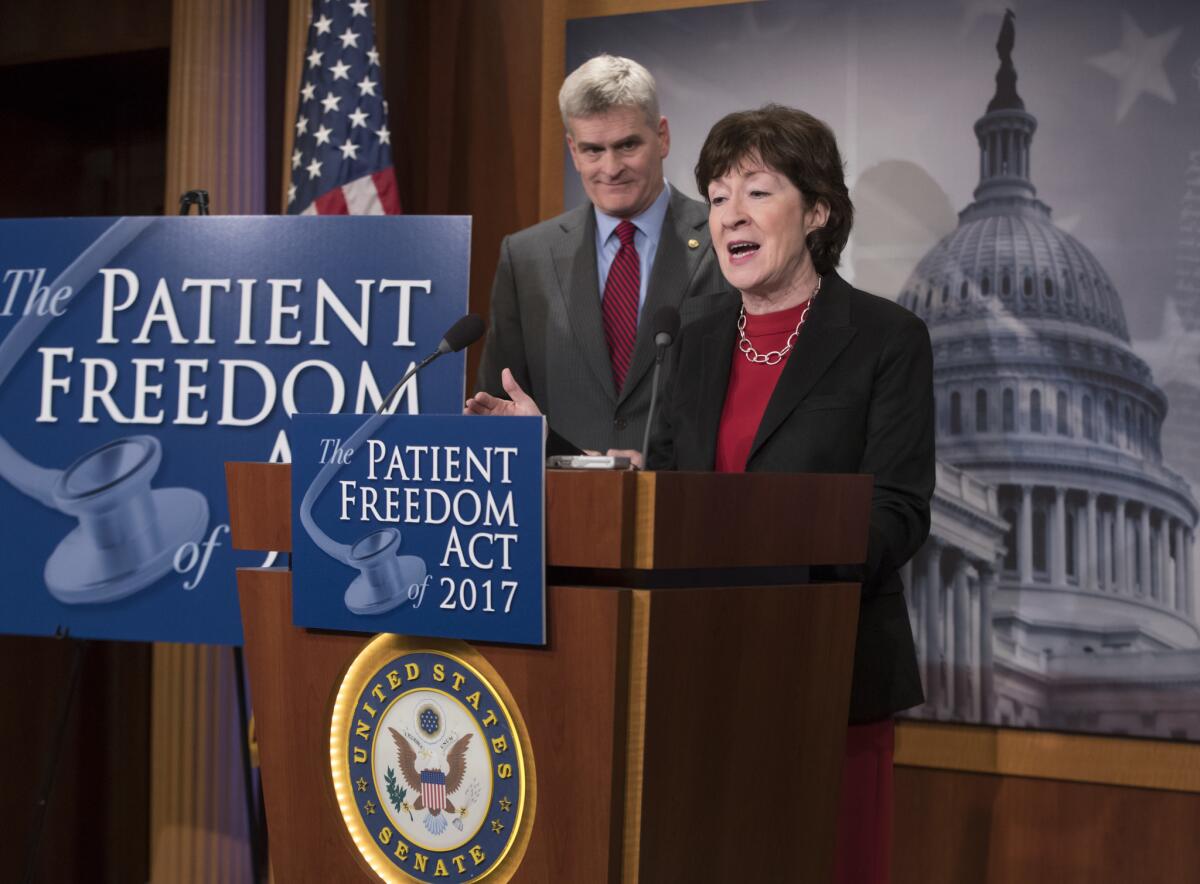Senators to watch: These Republicans could make or break the effort to repeal Obamacare

Reporting from Washington — Senate Republicans have been working behind closed doors for weeks on their plan to repeal and replace Obamacare.
But not all GOP senators like the emerging legislation — which will be unveiled Thursday — and Senate leaders can’t afford to lose more than a couple when they vote, probably next week.
The most conservative senators want a quicker, more decisive end to the Affordable Care Act. Those from centrist states prefer a slower unraveling — preferring to keep Obamacare’s federal funding that allowed them to expand Medicaid to more residents.
With a slim 52-seat majority and staunch Democratic opposition, GOP leaders can afford to lose just two Republican senators and still pass the bill. Even then, they would need Vice President Mike Pence for the tie-breaking vote.
Here are nine senators to watch:
The Hard-Liners

Sen. Rand Paul
The libertarian-leaning Kentucky senator dismisses GOP replacement proposals as Obamacare-lite, criticizing them as failing to keep the Republican promise of fully repealing the Affordable Care Act. Paul wants to gut the Medicaid expansion and do away with federal subsidies to help lower-income Americans afford private insurance on the Obamacare marketplace. He staged an elaborate mock hunt through the Capitol in the spring for the then-secretive House GOP bill being shaped behind closed doors. Paul remains open to his colleagues’ ideas. But he is the conservative senator most likely to vote no.
Sen. Ted Cruz
A self-appointed go-between for Senate Republicans and conservatives in the House Freedom Caucus, the firebrand Texan has inserted himself in almost every aspect of the healthcare negotiations. He even once dashed to President Trump’s Mar-a-Lago estate in Florida to meet with White House staff. Cruz shares the concerns of conservatives who argue the emerging GOP approach is not a full repeal. But he also is trying to prevent failure to overhaul the Affordable Care Act from becoming, as he puts it, Republicans’ “Waterloo.” Up for reelection next year, he is likely to vote for the Republican bill as he works to refashion his image as a leader.
Sen. Mike Lee
The quiet Utahn, often seen as the conservative conscience of the Senate, shares worries that the emerging GOP approach is not sufficient in undoing the Affordable Care Act. Even though he often bucks party leadership in pursuit of a vote that fits his purist policy positions, he is more likely to join his colleagues to support the bill than be the one to tank it.
The Keep-Medicaid (for Now) Coalition

Sen. Rob Portman
Ohio has 680,000 additional residents receiving insurance though Medicaid thanks to the state’s decision to take the federal funding offered to expand its safety net healthcare program. Preventing those Ohioans from losing their insurance is a key goal for the senator. Portman has signaled a willingness to curtail the program, just not right away. The state also is reeling from an opiate crisis, and many people addicted to heroin and other opiates rely on Medicaid for care. Still, Portman often sticks with party leadership and is likely to give his vote for the bill, especially if adjustments are made for his state.
Sen. Shelley Moore Capito
Residents in rural West Virginia are also deeply reliant on Medicaid, which has expanded under Obamacare to provide care for an additional 180,000 residents, according to the Kaiser Family Foundation. Capito must balance her state’s robust support for Trump with the fallout that would likely come from cutting residents off Medicaid. She, too, prefers a slower phase-out. The opiate epidemic in West Virginia only deepens her concerns. Still, Capito is a newer senator not known for bucking leadership, and may be inclined to join her colleagues to pass the bill.
Sen. Dean Heller
Nevada’s Heller is one of the most endangered senators up for reelection in 2018. His swing state also expanded its Medicaid enrollment under Obamacare – and is trying to boost it even more. Republican Gov. Brian Sandoval just vetoed legislation that would have allowed residents to buy into Medicaid if they needed coverage but don’t qualify as low-income. But the debate is far from over. Heller is pushing his colleagues for a longer transition period away from Medicaid – seven or even 10 years. But that seems unlikely. The question will be whether Heller can settle for a sooner end to the program or is he willing to risk angering Trump supporters with a no vote.
Sen. Lisa Murkowski
The Alaska senator wants to ensure Medicaid funding for her far-flung residents, whose healthcare costs run high in part because of the state’s expanse and isolation. She also stands firmly, as one of the few Republican women in the Senate, against GOP efforts to end funding for Planned Parenthood. Murkowski has an independent streak and has been known to part ways with leadership. Republican leaders will likely need to strike a deal to earn her vote.
The Fix-Obamacare Wing

Sen. Bill Cassidy
A physician who has spent a career caring for poorer patients, Cassidy of Louisiana has been at the forefront of trying to fix Obamacare with his own bill that repeals key aspects of the Affordable Care Act but maintains crucial funding for states. He is conservative, but wary of rolling back the Medicaid expansion that his state began in 2016. Cassidy told reporters recently he was encouraged by negotiations with his Senate colleagues, and realizes not all his ideas would be in the final bill. Despite his early concerns, he will probably be supportive of the Senate effort.
Sen. Susan Collins
The Mainer is the most centrist Republican in the Senate, and was an early backer of Cassidy’s efforts to repair, rather than gut, Obamacare. Collins also shares concerns about cutting funds for Planned Parenthood. Often a political outlier in her party, she remains a team player. Once a highly sought-after vote when Democrats approved Obamacare, she ultimately joined all Republicans in opposing it. Her vote will be crucial.
ALSO
With a push from Trump, House Republicans pass Obamacare overhaul
More coverage of politics and the White House
More to Read
Get the L.A. Times Politics newsletter
Deeply reported insights into legislation, politics and policy from Sacramento, Washington and beyond. In your inbox three times per week.
You may occasionally receive promotional content from the Los Angeles Times.











